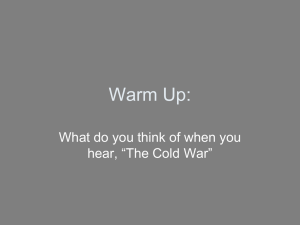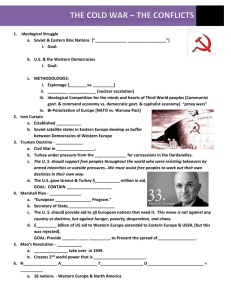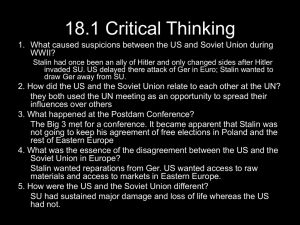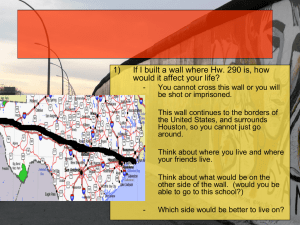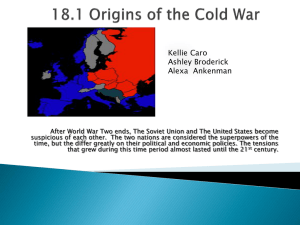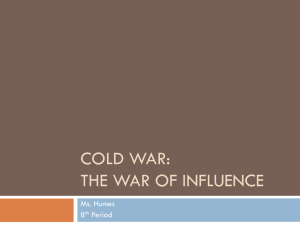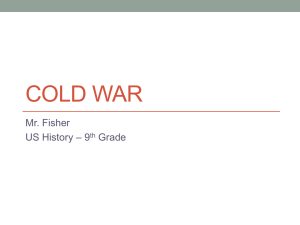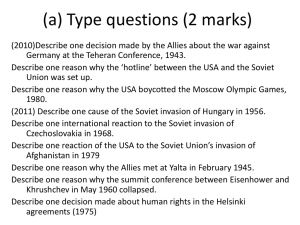Map Activity_US and Europe after WWII - Hamilton-Class-WIKI
advertisement
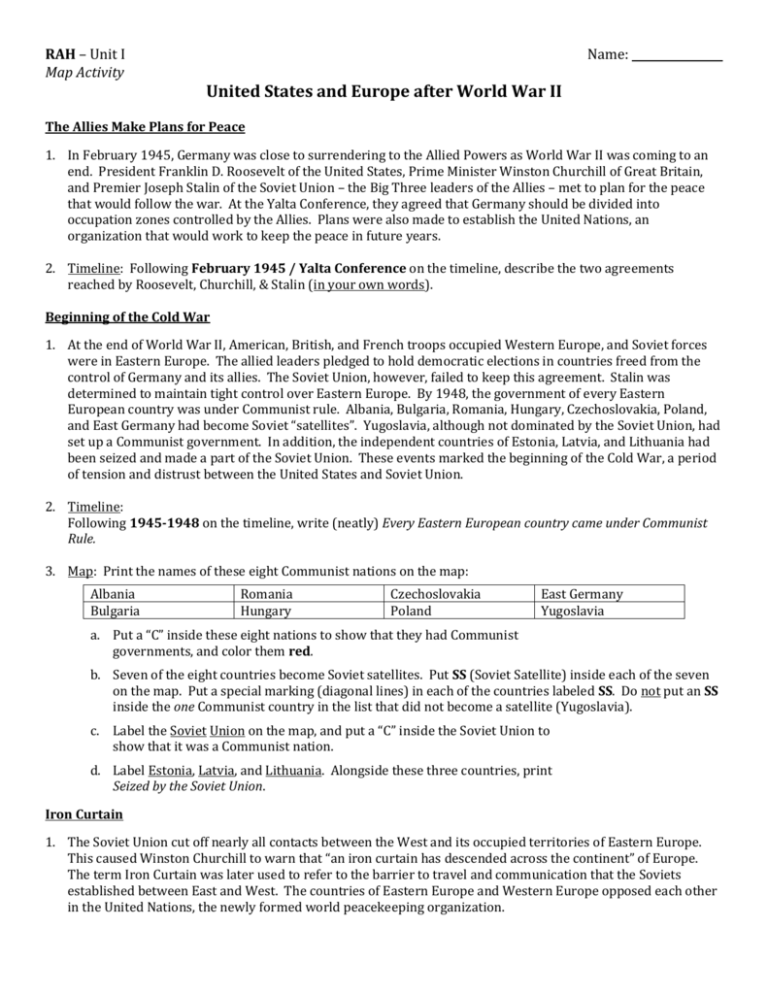
RAH – Unit I Map Activity Name: United States and Europe after World War II The Allies Make Plans for Peace 1. In February 1945, Germany was close to surrendering to the Allied Powers as World War II was coming to an end. President Franklin D. Roosevelt of the United States, Prime Minister Winston Churchill of Great Britain, and Premier Joseph Stalin of the Soviet Union – the Big Three leaders of the Allies – met to plan for the peace that would follow the war. At the Yalta Conference, they agreed that Germany should be divided into occupation zones controlled by the Allies. Plans were also made to establish the United Nations, an organization that would work to keep the peace in future years. 2. Timeline: Following February 1945 / Yalta Conference on the timeline, describe the two agreements reached by Roosevelt, Churchill, & Stalin (in your own words). Beginning of the Cold War 1. At the end of World War II, American, British, and French troops occupied Western Europe, and Soviet forces were in Eastern Europe. The allied leaders pledged to hold democratic elections in countries freed from the control of Germany and its allies. The Soviet Union, however, failed to keep this agreement. Stalin was determined to maintain tight control over Eastern Europe. By 1948, the government of every Eastern European country was under Communist rule. Albania, Bulgaria, Romania, Hungary, Czechoslovakia, Poland, and East Germany had become Soviet “satellites”. Yugoslavia, although not dominated by the Soviet Union, had set up a Communist government. In addition, the independent countries of Estonia, Latvia, and Lithuania had been seized and made a part of the Soviet Union. These events marked the beginning of the Cold War, a period of tension and distrust between the United States and Soviet Union. 2. Timeline: Following 1945-1948 on the timeline, write (neatly) Every Eastern European country came under Communist Rule. 3. Map: Print the names of these eight Communist nations on the map: d Albania Bulgaria Romania Hungary Czechoslovakia Poland East Germany Yugoslavia d a. Put a “C” inside these eight nations to show that they had Communist governments, and color them red. b. Seven of the eight countries become Soviet satellites. Put SS (Soviet Satellite) inside each of the seven on the map. Put a special marking (diagonal lines) in each of the countries labeled SS. Do not put an SS inside the one Communist country in the list that did not become a satellite (Yugoslavia). c. Label the Soviet Union on the map, and put a “C” inside the Soviet Union to show that it was a Communist nation. d. Label Estonia, Latvia, and Lithuania. Alongside these three countries, print Seized by the Soviet Union. Iron Curtain 1. The Soviet Union cut off nearly all contacts between the West and its occupied territories of Eastern Europe. This caused Winston Churchill to warn that “an iron curtain has descended across the continent” of Europe. The term Iron Curtain was later used to refer to the barrier to travel and communication that the Soviets established between East and West. The countries of Eastern Europe and Western Europe opposed each other in the United Nations, the newly formed world peacekeeping organization. 2. Timeline: Following 1946 on the timeline, print Winston Churchill warns that “an iron curtain has descended across the Continent” of Europe. 3. Map: Create your own Iron Curtain. Draw a line that separates Europe. A great example of this symbolic separation is on page 609. Truman Doctrine 1. In 1946 and 1947, Communist revolutionaries threatened to overthrow the governments of Greece and Turkey. To prevent this from happening, President Harry Truman declared that the United States would help any free nation resist Communist regression. Congress approved $400 million in aid for Greece and Turkey, which strengthened the two countries and kept the Communists from taking over. The U.S. aid program became down as the Truman Doctrine. Aimed at Soviet Expansion in Europe, the Truman Doctrine developed into the “containment policy”. The purpose of the containment policy was to limit the spread of communism throughout the world. 2. Timeline: Following 1947 on the timeline, print The Truman Doctrine marks the beginning of the U.S. containment policy. 3. Map: Label Greece and Turkey on the Map, and print Truman Doctrine below the two countries. Marshall Plan 1. Secretary of State George C. Marshall wanted to give U.S. economic aid to all Western European countries. His proposal came to be known as the Marshall Plan. The United States believed that a strong Western Europe would block the spread of Communism. About $13 billion in food, machinery, and other products was sent to Europe over a 5-year period. 2. Timeline: Following 1948-1953 on the timeline, print The Marshall Plan strengthens Western Europe and helps protect it from communism. Berlin Airlift 1. In June 1948, American, British, and French forces occupied democratic West Germany. Soviet troops controlled Communist East Germany. Inside of East Germany was the city of Berlin. The United States, Great Britain, and France held West Berlin, while East Berlin was in Soviet hands. Supplies to West Berlin had to be transported 110 miles through the Soviet occupation zone. The leaders of the Soviet Union thought they could blockade West Berlin and force the Americans, British, and French to leave the city. Soviet troops blocked all railroad, highway, and water routes through East Germany to West Berlin. Inside of pulling out of West Berlin, the Americans, British, and French organized the Berlin Airlift. For 11 months, West Berlin was supplied with food and fuel entirely by airplanes. The Soviet Union hauled the blockade in May 1949, and the Allies ended the airlift. 2. Timeline: Following 1948-1949 on the timeline, print The Allies set up the Berlin Airlift, and the Soviet Union ends its blockade of West Berlin. 3. Map: Label West Germany and label Berlin (dot inside of E. Germany) Continue… North Atlantic Treaty Organization and Warsaw Pact 1. In 1949, the United States, Canada, and many Western European countries formed a mutual defense alliance called the North American Treaty Organization. The member nations wanted to be able to defend themselves against a possible invasion by the Soviet Union or any other country. If one or more NATO members was attacked, all countries in the alliance would come to their defense. In 1955, the Soviet Union and its allies in Eastern Europe formed their own military alliance – the Warsaw Pact. 2. Timeline: Following 1949 on the timeline, print The U.S., Canada, and Western European Countries form NATO. Following 1955 on the timeline, print The Soviet Union and its Eastern European satellites join the Warsaw Pact. 3. Map: a. Label these Western European nations that joined NATO in 1949. Belgium France Luxembourg Great Britain Portugal Netherlands Denmark Italy Norway b. Color the NATO countries. Please use the same color for each. c. In the early 1950s, Greece, Turkey, and West Germany also joined the North Atlantic Treaty Organization (NATO). Color these countries in the same way as the other NATO members. You’re Done! Early Cold War Timeline February 1945 [Yalta Conference] 1945-1948 1946 1947 1948-1953 1948-1949 1949 1955
